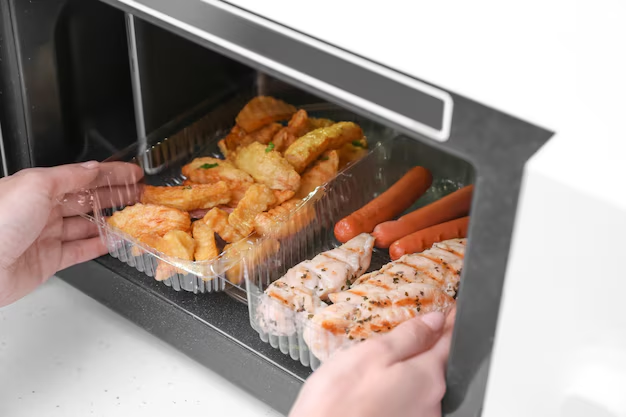Can Using Microwaves Cause Cancer? Here's What You Need to Know
Imagine this: it's a busy weeknight, and you're staring at your microwave, watching your leftovers spin in a glow of convenience. Suddenly, a thought creeps in — could this everyday appliance actually be harmful? Is there any truth to the notion that microwaves might cause cancer?
Understanding Microwaves: A Household Staple
Microwaves have carved a niche in our kitchens thanks to their efficiency and ease of use. Whether you're reheating last night's dinner or popping a quick bag of popcorn, the appliance simplifies culinary tasks. But how exactly does it work?
How Microwaves Work
Microwaves use electromagnetic radiation to cook food. These waves are absorbed by water molecules within the food, causing them to vibrate and produce heat. This method cooks the food internally, significantly faster than traditional convection ovens. With their prevalent use, it’s essential to understand not only how they operate but also any potential risks involved.
Do Microwaves Emit Radiation?
Types of Electromagnetic Radiation
Radiation can sound intimidating, but it's a natural part of our environment. There’s a broad spectrum of electromagnetic radiation ranging from radio waves to gamma rays. Ionizing radiation — like X-rays and gamma rays — has enough energy to remove tightly bound electrons from atoms, leading to potential cell damage and cancer risk. Non-ionizing radiation, which includes microwaves, lacks this energy.
Microwaves: Non-Ionizing Radiation
Microwaves fall under the category of non-ionizing radiation. They aren't powerful enough to damage cellular DNA or cause cancer directly through ionization. This subtle yet important distinction places microwaves apart from harmful varieties of radiation.
Addressing Common Concerns: Microwaves and Cancer
Does Heating Food in Microwaves Produce Carcinogens?
A common worry is whether microwaves produce harmful chemicals or carcinogens. While microwaving plastic containers not intended for such use can release chemicals, using microwave-safe materials is widely considered safe. Always look for "microwave-safe" labels on containers to avoid this risk.
Nutrient Retention in Microwaved Food
Some argue that microwaving destroys nutrients, making the food less healthy. The truth is, all cooking methods affect nutrient levels. Microwaving may even preserve nutrients better than methods like boiling, which can leach water-soluble vitamins.
Global Health Perspectives on Microwaves
Authoritative health organizations including the World Health Organization, state that when used properly, microwaves are safe and do not cause cancer. The FDA regulates microwave ovens to ensure they comply with safety standards that reduce potential risks.
Practical Tips for Safe Microwave Use
To enjoy the convenience of microwaves safely, consider these guidelines:
- Use Microwave-Safe Containers: Stick to glass, ceramic, or certified plastics.
- Avoid Superheating Water: Be cautious to avoid superheating, which can cause burns.
- Ensure Proper Functioning: Check the door seal and ensure no damage that might cause radiation to escape.
- Understand Product Labels: Foods like popcorn often come with specific packaging for microwaving; follow instructions carefully.
Exploring Related Topics: Beyond the Basics
Innovations in Microwave Technology
Microwave technology continues to evolve. Today, you can find products with advanced features like sensor cooking, which adjusts the cooking time automatically based on moisture levels. This enhances precision and prevents overcooking, further preserving nutrients.
Alternative Cooking Methods
For those concerned about using microwaves, there are alternatives such as induction cooktops or steam ovens, which offer quick and even cooking without electromagnetic radiation. Each method has its pros and cons regarding energy efficiency and nutritional retention.
Final Thoughts: Navigating Your Kitchen with Confidence
The evidence available today indicates that microwaves, when used per guidelines, are a safe, efficient way to cook and heat food. They do not pose a cancer risk, based on the non-ionizing radiation they release. By understanding their function and adhering to safety practices, you can continue to enjoy their benefits.
Remember, the key to using any appliance confidently is knowledge and safe practices. Embrace technology, but remain informed and cautious — a good practice for any aspect of modern living.
Quick Summary of Microwave Safety Tips 🔍
- Choose Appropriate Dishes: Always look for "microwave-safe" on your containers. 🥣
- Follow Instructions: Pay attention to guidelines on food packaging for safe cooking. 📜
- Regularly Maintain the Appliance: Ensure the microwave door seals well and functions properly. 🔧
- Explore New Tech: Consider advancements like sensor cooking for enhanced safety and convenience. 🌟
Understanding and applying these or any practical safety tips can help maintain your peace of mind while you enjoy the conveniences of modern cooking! 🍽️

Related Articles
- Are Breast Cancer Lumps Painful
- Are Chills a Sign Of Cancer
- Are Colon Spasms a Sign Of Cancer
- Are Lytic Lesions Always Cancer
- Are Polyps Cancer
- Can a Blood Test Detect Cancer
- Can a Ct Scan Detect Cancer
- Can a Dexa Scan Show Cancer
- Can a Gastric Emptying Scan Show Cancer
- Can a Lung Biopsy Cause Cancer To Spread
